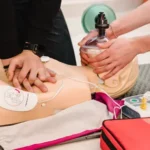A hospice worker encounters many medical emergencies daily. They have patients suffering from various diseases, and looking after them is challenging. However, the best way forward is to stay prepared for emergencies with knowledge from life-saving courses. Advanced Cardiovascular Life Support course options for hospice workers can help them in many ways. Learn how ACLS training course options can help hospice workers tackle daily medical emergencies.
What medical emergencies does a hospice worker face?
A hospice worker’s daily chores include looking after terminally ill individuals. Most people at hospice centers suffer from incurable diseases. They often have many parallel illnesses, leading to medical emergencies.
Hospice workers may encounter the following medical emergencies:
- Difficulty Breathing: A person experiencing an asthma attack or an allergic reaction may have trouble breathing and require immediate assistance with airway management.
- Severe Pain: When someone is experiencing intense and unbearable pain. It may require immediate attention and relief.
- Heart Attack: A heart attack occurs when the heart muscles seize to work. When the heart suddenly stops working correctly, it causes chest pain and shortness of breath.
- Stroke: Resistance to the blood flow to the brain may cause a stroke. It often leads to sudden weakness, trouble speaking, or confusion.
- Falls: A patient may slip or lose balance at the center. As many people here are elderly, they may get severely injured.
- Seizures: People with abnormal neural activity could have seizures at any time. It is common for a hospice nurse to encounter a person having a seizure.
- Severe Bleeding: Getting cuts and wounds is common for people who cannot walk properly or are under heavy medication.
Remember, in case of any emergency, it is always the nurses that come to the rescue of the patients. They spend the most time with their patients and need to know many life-saving courses.
What are the teachings of an ACLS certification course?
An ACLS certification course for healthcare professionals teaches essential knowledge and skills to help save lives in emergencies:
- Recognizing Emergencies: You learn to identify when someone is very sick, or their heart has stopped working.
- CPR (Cardiopulmonary Resuscitation): The course teaches you to do chest compressions and rescue breaths. Through these actions, you can keep the blood and oxygen flowing until help arrives.
- Using an AED (Automated External Defibrillator): You gain an in-depth understanding of the AED. In cardiovascular emergencies, you can even use an electric shock to restart a person’s heart.
- Treating Heart Rhythm: You learn to identify irregular heart rhythms. It helps to identify early signs of cardiac arrest. You also learn to give the proper medications or use special equipment to fix the irregular rhythm.
- Managing Breathing Difficulties: ACLS training teaches you how to help someone with trouble breathing. You also learn the process of giving oxygen or using a bag-mask device.
- Recognizing and Treating Strokes: By understanding the signs of a stroke, you can help the person faster. It helps reduce the damage to the brain and could save their life.
- Teamwork and Communication: You learn to work together with others in an emergency. You can follow commands and effectively communicate information with your peers.
- Patient Assessment: The courses teach you how to check a person’s vital signs. You also learn to interpret the information and provide appropriate care.
- Emergency Medications: A large part of the course helps you to become familiar with different medications.
How does an ACLS course benefit hospice workers?
ACLS certified hospice workers and healthcare professionals gain benefits from the course in several ways:
- Increased Preparedness: An ACLS certification for hospice workers can make them more confident. They are ready to handle emergencies that may arise while caring for patients.
- Life-saving Skills: Workers learn essential life-saving skills like high-quality CPR and AED from an online ACLS course. These skills help revive someone suffering from sudden cardiac arrest.
- Quick Response: Hospice workers promptly recognize emergencies through their training. It allows them to respond with the necessary actions, improving the chances of a positive outcome.
- Enhanced Teamwork: ACLS courses teach the importance of working together. You can help patients faster if everyone works like a team.
- Better Patient Care: After taking the course, hospice workers can provide immediate relief and support to distressed patients. It will increase the patient’s chances of survival.
- Improved Decision-making: The life support ACLS course teaches hospice workers how to make quick and critical decisions. It ensures that the best possible care is available to patients in life-threatening emergencies.
Conclusion
An ACLS certification for hospice workers is valuable as it helps them provide better support and end-of-life care to patients. ACLS skills are an additional asset to handle emergencies within the hospice setting. If you work in such a setup and are considering this course, head to the Advanced Cardiovascular Life Support Now website today. Go through the course and get started on your life-saving journey today.






